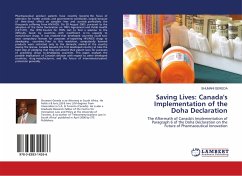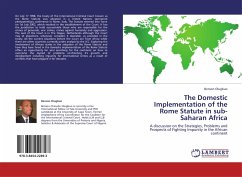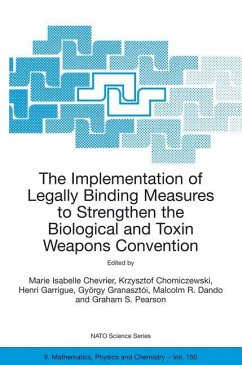
Saving Lives: Canada's Implementation of the Doha Declaration
The Aftermath of Canada's Implementation of Paragraph 6 of the Doha Declaration on the Future of Pharmaceutical Innovation
Versandkostenfrei!
Versandfertig in 6-10 Tagen
32,99 €
inkl. MwSt.

PAYBACK Punkte
16 °P sammeln!
Pharmaceutical product patents have recently become the focus of attention for health activists and governments worldwide, largely because of their direct effect on people's lives and survival; particularly the thousands suffering from HIV/AIDS. On 30 August 2003, pursuant to the adoption of the Doha Declaration on TRIPs Agreement and Public Health [14/11/01], the WTO Council for TRIPs met to find a solution to the difficulty faced by countries with insufficient or no capacity to manufacture drugs. It was resolved that developed countries could now issue compulsory licenses for purposes of exp...
Pharmaceutical product patents have recently become the focus of attention for health activists and governments worldwide, largely because of their direct effect on people's lives and survival; particularly the thousands suffering from HIV/AIDS. On 30 August 2003, pursuant to the adoption of the Doha Declaration on TRIPs Agreement and Public Health [14/11/01], the WTO Council for TRIPs met to find a solution to the difficulty faced by countries with insufficient or no capacity to manufacture drugs. It was resolved that developed countries could now issue compulsory licenses for purposes of exporting HIV/AIDS drugs to developing countries. Prior to this resolution, compulsorily licensed products were restricted only to the domestic market of the country issuing the license. Canada became the first developed country to take the bold step of pledging that they will amend their patent laws for purposes of providing drugs to developing countries. This paper analyses the possible implications of Canada's decision with respect to other developed countries, drug manufacturers, and the future of international patent protection generally.












